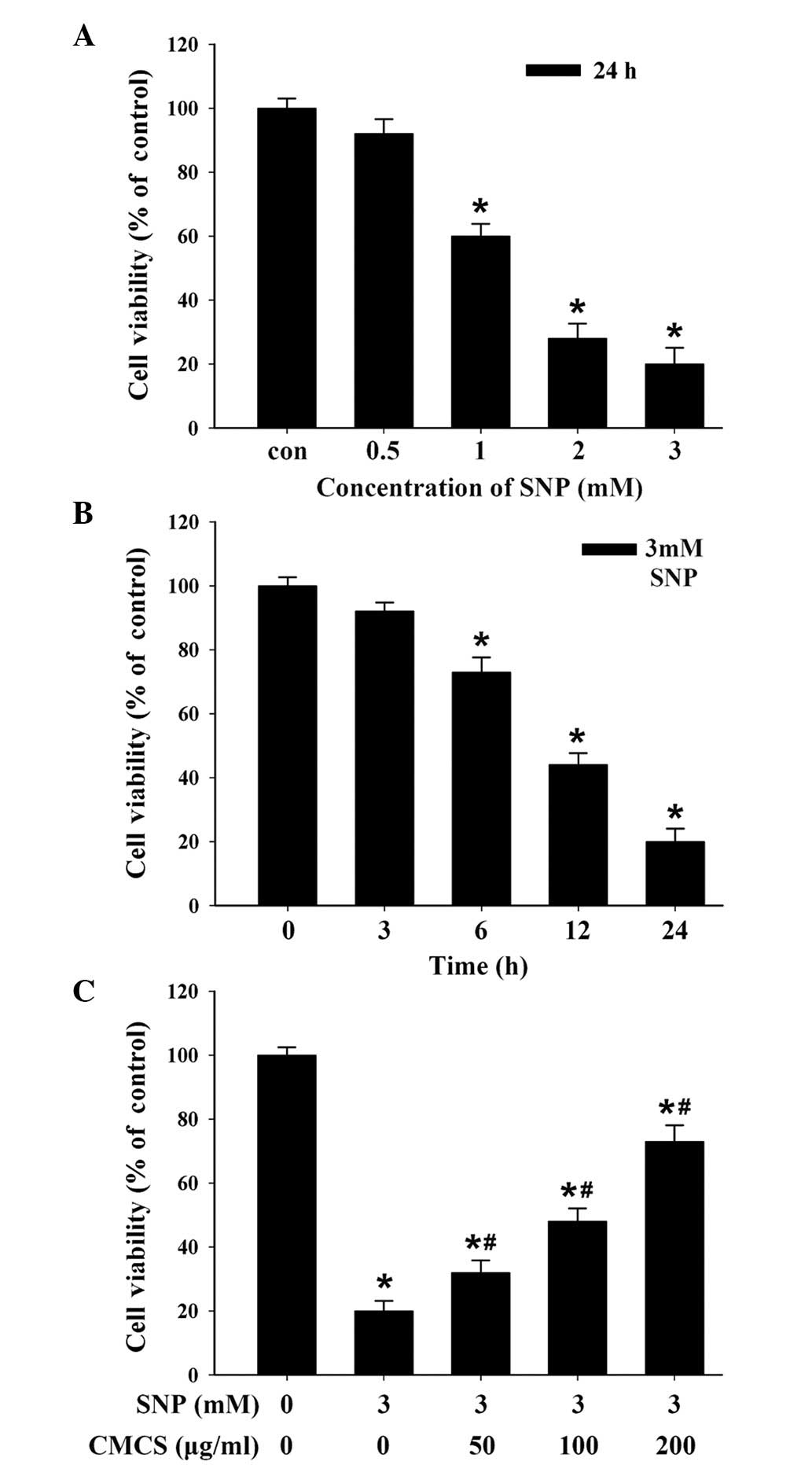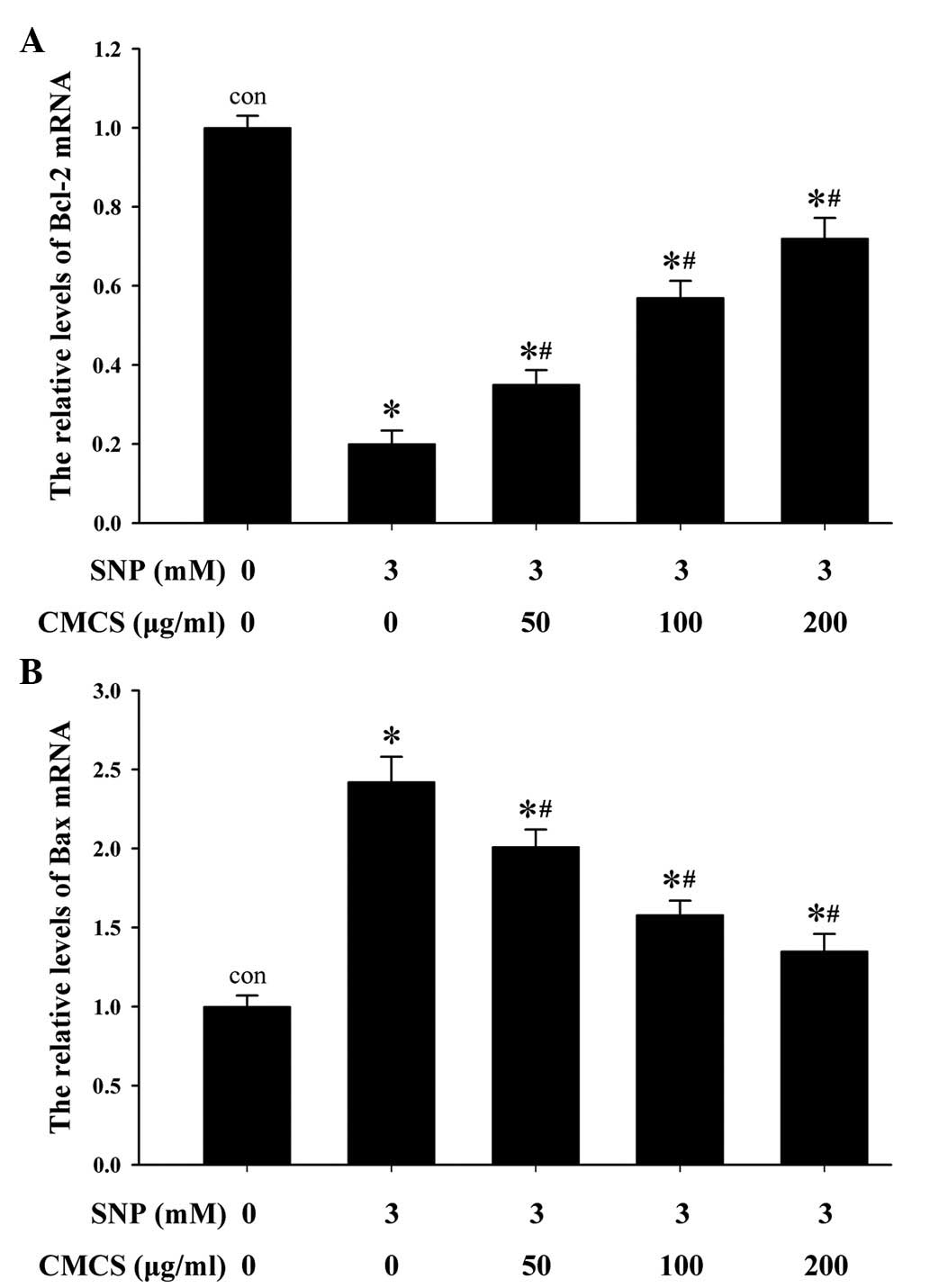|
1
|
Loeser RF: Aging and osteoarthritis: The
role of chondrocytes senescence and aging changes in the cartilage
matrix. Osteoarthritis Cartilage. 17:971–979. 2009. View Article : Google Scholar : PubMed/NCBI
|
|
2
|
Thomas CM, Fuller CJ, Whittles CE and
Sharif M: Chondrocyte death by apoptosis is associated with the
initiation and severity of articular cartilage degradation. In J
Rheum Dis. 14:191–198. 2011. View Article : Google Scholar
|
|
3
|
Chen Q, Zhang B, Yi T and Xia C: Increased
apoptosis in human knee osteoarthritis cartilage related to the
expression of protein kinase B and protein kinase Cα in
chondrocytes. Folia Histochem Cytobiol. 50:137–143. 2012.
View Article : Google Scholar : PubMed/NCBI
|
|
4
|
Huang JG, Xia C, Zheng XP, Yi TT, Wang XY,
Song G and Zhang B: 17β-Estradiol promotes cell proliferation in
rat osteoarthritis model chondrocytes via PI3K/Akt pathway. Cell
Mol Biol Lett. 16:564–575. 2011. View Article : Google Scholar : PubMed/NCBI
|
|
5
|
Andjelkov N, Elvenes J, Knutsen G and
Johansen O: Beta-endorphin regulation of MAPKs in cultures human
articular chondrocytes: MAPK inhibitors prevent the increase of
IL-1 beta protein levels during beta-endorphin stimulation. Cell
Commun Adhes. 14:1–8. 2007. View Article : Google Scholar : PubMed/NCBI
|
|
6
|
Ding L, Guo D and Homandberg GA: The
cartilage chondrolytic mechanism of fibronectin fragments involves
MAP kanases: Comparison of three fragments and native fibronectin.
Osteoarthritis Cartilage. 16:1253–1262. 2008. View Article : Google Scholar : PubMed/NCBI
|
|
7
|
Kong D, Zheng T, Zhang M, Wang D, Du S, Li
X, Fang J and Cao X: Static mechanical stress induces apoptosis in
rat endplate chondrocytes through MAPK and mitochondria-dependent
caspase activation signaling pathways. PLoS One. 8:e694032013.
View Article : Google Scholar : PubMed/NCBI
|
|
8
|
Takebe K, Nishiyama T, Hayashi S,
Hashimoto S, Fujishiro T, Kanzaki N, Kawakita K, Iwasa K, Kuroda R
and Kurosaka M: Regulation of p38 MAPK phosphorylation inhibits
chondrocyte apoptosis in response to heat stress or mechanical
stress. Int J Mol Med. 27:329–335. 2011.
|
|
9
|
Wang H, Wang Z, Chen J and Wu J: Apoptosis
induced by NO via phosphorylation of p38 MAPK that stimulates
NF-kappa B, p53 and caspase-3 activation in rabbit articular
chondrocytes. Cell Biol Int. 31:1027–1035. 2007. View Article : Google Scholar : PubMed/NCBI
|
|
10
|
Hamamura K, Goldring MB and Yokota H:
Involvement of p38 MAPK in regulation of MMP-13 mRNA in
chondrocytes in response to surviving stress to endoplasmic
reticulum. Arch Oral Biol. 54:279–286. 2009. View Article : Google Scholar :
|
|
11
|
Namdari S, Wei L, Moore D and Chen Q:
Reduced limb length and worsened osteoarthritis in adult mice after
genetic inhibition of p38 MAP kinase activity in cartilage.
Arthritis Rheum. 58:3520–3529. 2008. View Article : Google Scholar : PubMed/NCBI
|
|
12
|
Sena P, Manfredini G, Benincasa M, Mariani
F, Smargiassi A, Catani F and Palumbo C: Up-regulation of the
chemo-attractive receptor ChemR23 and occurrence of apoptosis in
human chondrocytesisolated from fractured calcaneal osteochondral
fragments. J Anat. 224:659–668. 2014. View Article : Google Scholar : PubMed/NCBI
|
|
13
|
Chen Q, Gao Y, Kao X, Chen J, Xue W, Xiong
Y and Wang Z: SNP-induced apoptosis may be mediated with caspase
inhibitor by JNK signaling pathways in rabbit articular
chondrocytes. J Toxicol Sci. 37:157–167. 2012. View Article : Google Scholar : PubMed/NCBI
|
|
14
|
Liu SQ, Qiu B, Chen LY, Peng H and Du YM:
The effects of carboxymethylated chitosan on metalloproteinase-1,-3
and tissue inhibitor of metalloproteinase-1 gene expression in
cartilage of experimental osteoarthritis. Rheumatol Int. 26:52–57.
2005. View Article : Google Scholar : PubMed/NCBI
|
|
15
|
Chen Q, Liu SQ, Du YM, Peng H and Sun LP:
Carboxymethylchitosan protects rabbit chondrocytes from
interleukin-1beta-induced apoptosis. Eur J Pharmacol. 541:1–8.
2006. View Article : Google Scholar : PubMed/NCBI
|
|
16
|
He B, Liu SQ, Chen Q, Li HH, Ding WJ and
Deng M: Carboxymethylated chitosan stimulates proliferation of
Schwann cells in vitro via the activation of the ERK and Akt
signaling pathways. Eur J Pharmacol. 667:195–201. 2011. View Article : Google Scholar : PubMed/NCBI
|
|
17
|
Tao HY, He B, Liu SQ, Wei AL, Tao FH, Tao
HL, Deng WX, Li HH and Chen Q: Effect of carboxymethylated chitosan
on the biosynthesis of NGF and activation of the Wnt/β-catenin
signaling pathway in the proliferation of Schwann cells. Eur J
Pharmacol. 702:85–92. 2013. View Article : Google Scholar : PubMed/NCBI
|
|
18
|
He B, Tao HY and Liu SQ: Neuroprotective
effects of carboxymethylated chitosan on hydrogen peroxide induced
apoptosis in Schwann cells. Eur J Pharmacol. 740:127–134. 2014.
View Article : Google Scholar : PubMed/NCBI
|
|
19
|
He B, Tao H, Liu S and Wei A: Protective
effect of carboxymethylated chitosan on hydrogen peroxide-induced
apoptosis in nucleus pulposus cells. Mol Med Rep. 11:1629–1638.
2015.
|
|
20
|
Li X, Du M, Liu X, Wu M, Ye H, Lin J, Chen
W and Wu G: Millimeter wave treatment inhibits NO-induced apoptosis
of chondrocytes through the p38MAPK pathway. Int J Mol Med.
25:393–399. 2010.PubMed/NCBI
|
|
21
|
Liang Q, Wang XP and Chen TS: Resveratrol
protects rabbit articular chondrocyte against sodium
nitroprusside-induced apoptosis via scavenging ROS. Apoptosis.
19:1354–1363. 2014. View Article : Google Scholar : PubMed/NCBI
|
|
22
|
Cuenda A, Rouse J, Doza YN, Meier R, Cohen
P, Gallagher TF, Young PR and Lee JC: SB203580 is a specific
inhibitor of a MAP kinase homologue which is stimulated by cellular
stresses and interleukin-1. FEBS Lett. 364:229–233. 1995.
View Article : Google Scholar : PubMed/NCBI
|
|
23
|
Glynn RW, Miller N, Mahon S and Kerin MJ:
Expression levels of HER2/neu and those of collocated genes at
17q12–21, in breast cancer. Oncol Rep. 28:365–369. 2012.PubMed/NCBI
|
|
24
|
Kühn K and Lotz M: Mechanisms of sodium
nitroprusside-induced death in human chondrocytes. Rheumatol Int.
23:241–247. 2003. View Article : Google Scholar : PubMed/NCBI
|
|
25
|
Chen Q, Mei X, Han G, Ling P, Guo B, Guo
Y, Shao H, Wang G, Cui Z, Bai Y and Xu F: Xanthan gum protects
rabbit articular chondrocytes against sodium nitroprusside-induced
apoptosis in vitro. Carbohydr Polym. 131:363–369. 2015. View Article : Google Scholar : PubMed/NCBI
|
|
26
|
Liu X, Yang F, Song T, Zeng A, Wang Q, Sun
Z and Shen J: Synthesis of carboxymethylated and quaternized
chitosan and their therapeutic effect on nonalcoholic Fatty liver
disease. J Agric Food Chem. 59:10683–10692. 2011. View Article : Google Scholar : PubMed/NCBI
|
|
27
|
Nam JP, Park SC, Kim TH, Jang JY, Choi C,
Jang MK and Nah JW: Encapsulation of paclitaxel into lauric
acid-O-carboxymetlyl chitosan transferring micelles for hydrophobic
drug delivery and site-specific targeted delivery. Int J Pharm.
457:124–135. 2013. View Article : Google Scholar : PubMed/NCBI
|
|
28
|
Blanco FJ, Ochs RL, Schwarz H and Lotz M:
Chondrocyte apoptosis induced by nitric oxide. Am J Pathol.
146:75–85. 1995.PubMed/NCBI
|
|
29
|
Lee HG and Yang JH: PCB126 induces
apoptosis of chondrocytes via ROS-dependent pathways.
Osteoarthritis Cartilage. 20:1179–1185. 2012. View Article : Google Scholar : PubMed/NCBI
|
|
30
|
Gungor I, Yilmaz A, Ozturk AM, Ergun MA,
Menevse S and Kaya K: Bupivacaine and levobupivacaine induce
apoptosis in rat chondrocyte cell cultures at ultra-low doses. Eur
J Orthop Surg Traumatol. 24:291–295. 2014. View Article : Google Scholar
|
|
31
|
Uehara Y, Hirose J, Yamabe S, Okamoto N,
Okada T, Oyadomari S and Mizuta H: Endoplasmic reticulum
stress-induced apoptosis contributes to articular cartilage
degeneration via C/EBP homologous protein. Osteoarthritis
Cartilage. 22:1007–1017. 2014. View Article : Google Scholar : PubMed/NCBI
|
|
32
|
Hwang HS and Kim HA: Chondrocyte apoptosis
in the pathogenesis of osteoarthritis. Int J Mol Sci.
16:26035–26054. 2015. View Article : Google Scholar : PubMed/NCBI
|
|
33
|
Li J and Yuan J: Caspases in apoptosis and
beyond. Oncogene. 27:6194–6206. 2008. View Article : Google Scholar : PubMed/NCBI
|
|
34
|
Wang H, Wang Z, Chen J and Wu J: Apoptosis
induced by NO via phosphorylation of p38 MAPK that stimulates
NF-kappaB, p53 and caspase-3 activation in rabbit articular
chondrocytes. Cell Biol Int. 31:1027–1035. 2007. View Article : Google Scholar : PubMed/NCBI
|
|
35
|
Sakata S, Hayashi S, Fujishiro T, Kawakita
K, Kanzaki N, Hashimoto S, Iwasa K, Chinzei N, Kihara S, Haneda M,
et al: Oxidative stress-induced apoptosis and matrix loss of
chondrocytes is inhibited by eicosapentaenoic acid. J Orthop Res.
33:359–365. 2015. View Article : Google Scholar
|
|
36
|
Antonsson B: Bax and other pro-apoptotic
Bcl-2 family 'killer-proteins' and their victim the mitochondrion.
Cell Tissue Res. 306:347–361. 2001. View Article : Google Scholar : PubMed/NCBI
|
|
37
|
Fan TJ, Han LH, Cong RS and Liang J:
Caspase family proteases and apoptosis. Acta Biochim Biophys Sin
(Shanghai). 37:719–727. 2005. View Article : Google Scholar
|




















